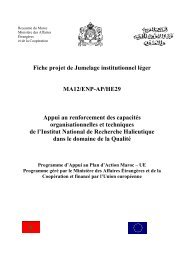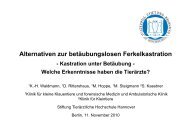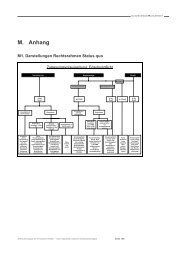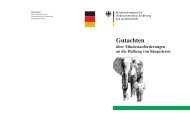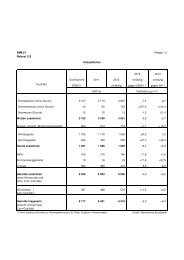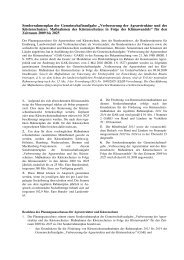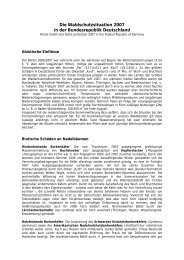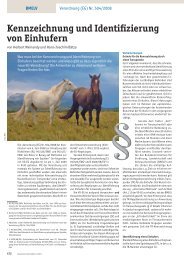Research Institutes overseen by the Federal Ministry of ... - BMELV
Research Institutes overseen by the Federal Ministry of ... - BMELV
Research Institutes overseen by the Federal Ministry of ... - BMELV
Create successful ePaper yourself
Turn your PDF publications into a flip-book with our unique Google optimized e-Paper software.
Legal Mandate<br />
FLI maintains upwards <strong>of</strong> 50 national reference laboratories<br />
for notifiable and reportable animal diseases. Accredited<br />
according to ISO/IEC 17025, <strong>the</strong>y investigate suspected cases,<br />
advise <strong>the</strong> competent veterinary authorities and conduct<br />
ring trials and o<strong>the</strong>r quality assurance measures for animal<br />
disease diagnostics in Germany. If an outbreak occurs,<br />
<strong>the</strong> institute runs epidemiological tests. It also performs<br />
risk assessments on infectious diseases in farm animals. At<br />
international level, FLI runs International Office <strong>of</strong> Epizootics<br />
(OIE) reference laboratories for avian influenza, enzootic<br />
bovine leukaemia, Newcastle disease, bovine herpes virus 1,<br />
brucellosis, chlamydiosis, glanders and rabies. It also serves<br />
as <strong>the</strong> OIE’s Collaborating Centre for Zoonoses in Europe<br />
and operates a WHO Collaborating Centre for Rabies. The<br />
various reference laboratories also conduct research o<strong>the</strong>r<br />
than that assigned <strong>by</strong> law.<br />
In addition to <strong>the</strong> above, FLI acts as <strong>the</strong> national approval<br />
and licensing authority for veterinary diagnostics and<br />
certain animal disease vaccines such as those used to control<br />
foot and mouth disease and classical swine fever.<br />
FLI advises <strong>the</strong> German government <strong>by</strong> issuing regular<br />
scientific opinions on <strong>the</strong> entire spectrum <strong>of</strong> animal health<br />
– from nutrition, to animal husbandry and genetics, to foodproducing<br />
animals and animal disease.<br />
Cooperation Activities<br />
FLI works closely with <strong>the</strong> National Crisis Centre for Animal<br />
Disease, <strong>the</strong> Länder Task Force and <strong>the</strong> competent Länderlevel<br />
authorities. Its researchers sit on national and international<br />
committees and belong to a range <strong>of</strong> research<br />
networks, both German and multinational. They conduct<br />
projects and engage in missions for international organisations<br />
like <strong>the</strong> International Office <strong>of</strong> Epizootics (OIE), <strong>the</strong><br />
European Food Safety Authority (EFSA), <strong>the</strong> World Health<br />
Organisation (WHO) and <strong>the</strong> UN Food and Agriculture<br />
Organisation (FAO). Many FLI scientists hold visiting pr<strong>of</strong>essorships<br />
and lectureships in universities at home and abroad,<br />
and <strong>the</strong>y cooperate with research institutes around <strong>the</strong><br />
world. Toge<strong>the</strong>r with <strong>the</strong> Paul Ehrlich Institute, FLI serves as<br />
<strong>the</strong> licensing and approval authority for serums, vaccines,<br />
antigens and detection methods used in veterinary medicine.<br />
In its work on zoonoses, FLI engages in interdisciplinary<br />
cooperation with human medicine research bodies like<br />
<strong>the</strong> Robert Koch Institute.<br />
11<br />
Extraction <strong>of</strong> fluid from eggs at an FLI laboratory<br />
Structure<br />
Founded on <strong>the</strong> Isle <strong>of</strong> Riems in 1910, <strong>the</strong> Friedrich Loeffler<br />
Institute was <strong>the</strong> world’s first virological research institute.<br />
Its responsibilities and research focus grew as <strong>the</strong> institute<br />
expanded. FLI currently employs a large staff <strong>of</strong> 650, <strong>of</strong><br />
which 160 are scientists. The institutes which make up FLI<br />
include:<br />
At <strong>the</strong> headquarters on <strong>the</strong> Baltic island <strong>of</strong> Riems:<br />
ó Institute <strong>of</strong> Molecular Biology<br />
ó Institute <strong>of</strong> Infectology<br />
ó Institute <strong>of</strong> Diagnostic Virology<br />
ó Institute <strong>of</strong> Novel and Emerging Diseases<br />
ó Institute <strong>of</strong> Immunology (still located in Tübingen)<br />
ó Institute <strong>of</strong> Epidemiology (still located in Wusterhausen)<br />
In Braunschweig:<br />
ó Institute <strong>of</strong> Animal Nutrition<br />
In Jena:<br />
ó Institute for Bacterial Infections and Zoonoses<br />
ó Institute for Molecular Pathogenesis<br />
In Mariensee:<br />
ó Institute <strong>of</strong> Farm Animal Genetics<br />
ó Institute for Animal Welfare and Livestock Husbandry<br />
(still located in Celle)<br />
ó FLI<br />
Friedrich Loeffler Institute, <strong>Federal</strong> <strong>Research</strong> Institute<br />
for Animal Health<br />
Südufer 10 | 17493 Greifswald-Insel Riems | Germany<br />
Telephone: +49 (0)38351 7-0<br />
Telefax: +49 (0)38351 7-151<br />
E-mail: poststelle@fli.bund.de | www.fli.bund.de



